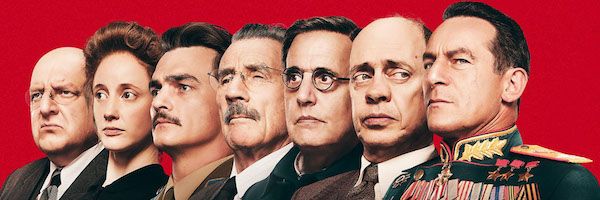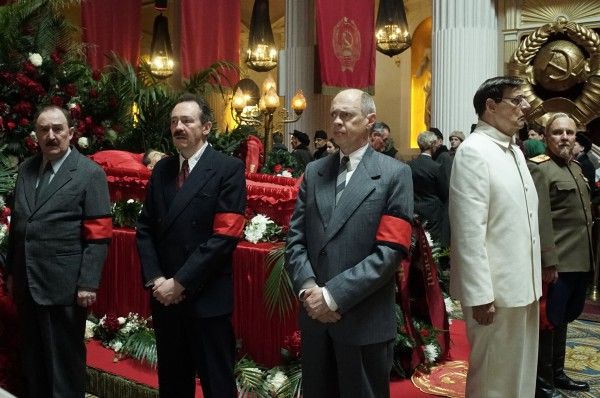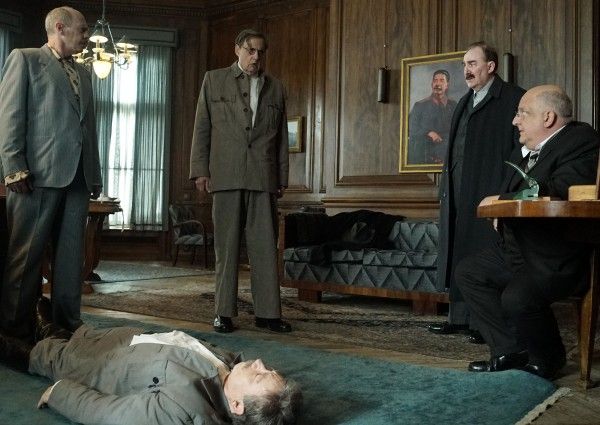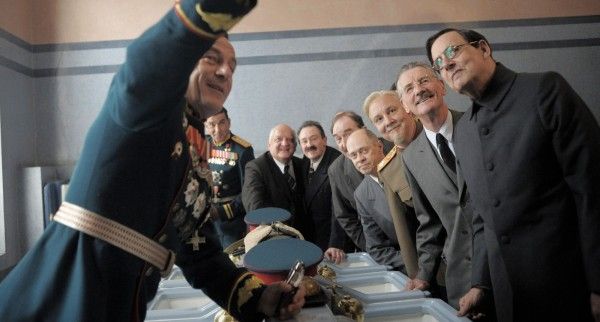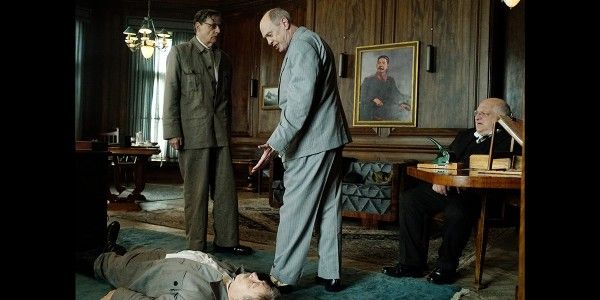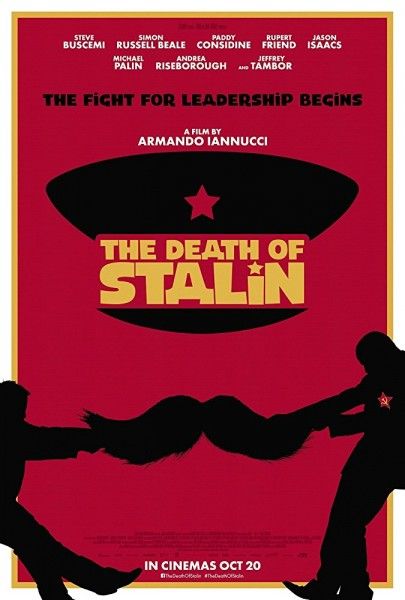From writer/director Armando Iannucci and inspired by the graphic novel of the same name, The Death of Stalin follows the Soviet dictator’s last days while depicting the absolute chaos of the regime after his death. In the days following Joseph Stalin’s collapse from a stroke, his subordinates began a fierce and desperate fight for succession to place themselves in a position that would ensure their rivals were disposed of and that they would make it out alive. The film, based on incredible true events, stars Simon Russell Beale, Steve Buscemi, Michael Palin, Jeffery Tambor, Jason Isaacs, Andrea Riseborough, Rupert Friend, Olga Kurylenko and Paddy Considine.
At the film’s Los Angeles press day, Collider got the opportunity to sit down with Armando Iannucci and talk about why he wanted to tell this story, how this is a different type of comedy, working with such an incredibly talented ensemble, and the benefit of a two-week rehearsal period prior to shooting. He also talked about his decision to leave HBO’s Veep after Season 4 and how exciting the success of that series was, as well as why he wants to turn the Charles Dickens story The Personal History of David Copperfield into a film and his approach to the material.
Collider: When you were approached with the idea of bringing this story to the screen, what was your reaction?
ARMANDO IANNUCCI: It’s a strange thing. When I was doing Veep, I knew that I was gonna finish my involvement after Season 4 ‘cause I wanted to make another film. Strange enough, I was looking at dictators, but thinking of a fictional contemporary one. This was about two years ago and I was thinking, “Something funny is going on. Something weird is happening in democracies.” That was in 2015. And then, the French production company Quad sent me this graphic novel and said, “We want to make this as a movie. What do you think?” I read it and I thought, “This is it!” It’s true, it’s absurd, it’s horrifying, it’s funny, and yet it’s crazy. Why come up with fiction?! I’m so used to doing my own stuff that I didn’t think I’d end up doing an adaptation of someone else’s work, but it was all there. The concert in the beginning was true, Stalin falling over and the guards disturbing him was true, not getting him a doctor because he’d arrested all of the doctors was true, and it goes on. It’s awful, and yet it’s hilarious, and yet it’s appalling. It’s all of that. We shot it in the summer of 2016, so it was even before Trump arose. Now, it’s released in this atmosphere where I don’t know what’s happening anymore. I don’t know where reality is anymore. Reality has jumped the shark.
Did you ever have a moment where you wondered how to make these despicable characters entertaining?
IANNUCCI: Their behavior creates the comedy. It’s a different sort of comedy. It’s a comedy of anxiety and panic. With Veep, it about, if we get this wrong, it will be embarrassing. This is, “I want to survive the day. I don’t want to be shot. What do I do?!” I knew I was going to be doing scenes that weren’t meant to be funny, but were meant to be shocking, dramatic or moving. I thought it was time I should take myself out of my comfort zone and take the audience a little bit out of their comfort zone, as they watch it. I want them to be engaged with it and enjoy it, as a comedy, but I also wanted to recreate the same sort of anxiety that people must have felt at the time, not quite knowing what’s gonna happen next. It was a lot of work, and there was a lot of thought, planning and preparation. In the editing, afterwards, there was a lot of making sure nothing overshadowed or detracted from the next thing. It was easy to get it down to roughly the length, but we spent four months getting each beat to feel that it belonged in that place to get that rhythm right.
This isn’t just a great ensemble of actors, but we get to see the ensemble together, for much of the film. What was that like?
IANNUCCI: I loved that! That’s what happens when you have farce. You have people coming in and out, and everyone together. I love keeping all of the plates spinning at once. That goes back to the Marx brothers and that kind of screwball comedy. The actors were all happy to come out and rehearse. That’s the way to get that ensemble feel. I put them in a room together, in a meeting room in a hotel, and we all ran it, from beginning to end, in the right order and with everyone there, so that we could get the physical and visual stuff going and make verbal connection. And then, everyone can get to know everyone else’s story, so that everyone know where everyone else is, mentally and emotionally. You don’t get that during the shoot because you’re shooting all over the place. It’s the only time you can get that, and it makes so much sense. I don’t know why other films don’t do it. The most expensive part of the production is the shoot, so why spend three hours discussing a line when you’ve got 150 people standing by, and a tiger and a green screen and a wind machine, when you can do that in a room with a cup of tea and a coffee and a sandwich, and no one is looking at their watches and saying, “Come on, just do anything!” And they loved it. Those big ensemble scenes, we could shoot really quickly because we’d rehearsed it. It was like putting on a play. It was like having two weeks of rehearsal, and then day one of the shoot was like opening night.
Because so many of the actors in this look very different from how we’re used to seeing them, were they immediate choices?
IANNUCCI: Yeah, more or less. I do it one at a time. Once you’ve got one person, you think, “Who’s the person that would compliment that person?” And then, you’ve got two and you go, “Who’s the third person that’s the best third person with these other two?” So, I started with Simon Russell Beale as Beria, who I always wanted to play Beria. He’s not known as a film actor, but Beria is not known as a character, and I liked that he would be a new experience for a lot of people. And then, there was Steve [Buscemi], who’s the opposite. Beria is very clipped, quiet and short, and Khrushchev is loud, voluble and waves his arms around, but has to become the next dictator. That’s funny, but also frightening. Also, I liked the idea from people of different acting backgrounds. Michael Palin is from Monty Python and is a great actor. I’ve always enjoyed his performances. Jeffrey Tambor is known for television comedy. The Larry Sanders Show is one of my all-time favorite shows and his character, Hank, is one of the richest comic characters. Andrea Riseborough is different in every movie she does and really gets under a character. Rupert Friend, who everyone just saw as this sniper in Homeland, is suddenly this drunk, loud guy. I remember his wife turning to me and saying, “He’s never had so much fun on set!” Everyone had a great time, and are all still friends. Stalin’s inner circle still meets for dinner, every couple of months.
Was it a hard decision, at all, to leave Veep, and do you check in with it, even though you’re not involved anymore?
IANNUCCI: They said, “Do you want to stay on as a consultant?,” and I said, “No.” (Showrunner) David [Mandel], who I knew, has to feel in charge, and everyone else has to feel that he’s in charge. I didn’t want people to see me as the old Pope, who’s still alive, next door and grumbling around the new Pope’s reforms. I said, “Just assume I’m dead. That’s best.” Also, I knew I was gonna do The Death of Stalin and I can’t compartmentalize like that, so I decided to be completely out. After four years of it, I felt I had said and done what I’d wanted to do with it. I’m more than happy for it to carry on, but my final episode, where it ended in an electoral tie, was my ending. That’s how I wanted to leave it, and I left it to David to sort that mess out, constitutionally. I sent them a little note to tell them that it was genuinely nice, not knowing what people were going to say next, when you watch an episode. You re-appreciate the cast and how great they are and how funny they are. I enjoy the fact that I’m not fretting over every line. I’m just enjoying it, as a member of the audience.
What was the most exciting thing about being a part of Veep and seeing the success that it’s had?
IANNUCCI: I loved the idea of coming out to work for HBO. Larry Sanders is my all-time favorite show, and I wanted to do a show set in Washington because I’m a bit of a political geek. I know the figures. I know that a hundred pilots are made and only two become shows, and then one of them gets canceled. I didn’t want to worry about it. I just wanted to make the pilot and make it as well as we could. And then, we had a series. I didn’t want to worry about that. I just wanted to make it as well as we could. And then, we had an Emmy nomination. And then, we were coming back. I expected it to have a cult following, but I didn’t expect it to have this mass audience and I certainly didn’t expect the Emmy thing. I thought that was a network thing, where you had to make 22 episodes a year and be doing it for 10 years. I can’t deny that that was very satisfying, but it wasn’t part of the plan and it wasn’t what I was expecting. I’m happy that that’s when I chose to stop. From beginning to end, we’d covered everything, so I was ready to call it quits and move on.
And now, you’re taking on Charles Dickens. What made you want to do that?
IANNUCCI: I’ve always been a huge Dickens fan. I like his ambition, his humor and his blend of naturalism, and yet he’s bizarre and colorful. He’s a very modern writer, in the themes of guilt, riches and poverty, and loss. His heroes are all frail. They all make mistakes, and they all admit to making mistakes. I’ve always been inspired by his writing, his ambition, and not being afraid to take on a big subject, but then carefully put very nicely delineated individuals within it and their stories. Having done Stalin, which is 1950s, to go back to the 1840s doesn’t seem like that big a leap, now that I’ve gone a little bit back in time.
What is it about The Personal History of David Copperfield, specifically, that made you want to turn it into a film?
IANNUCCI: There aren’t that many film versions of it, and everyone thinks they know it, but they don’t. If you ask them about it, they’ll go, “It’s got Mr. Micawber in it, hasn’t it?,” but that’s it. It’s got these great characters, and it’s a fantastic story. It’s the first novel he wrote in the first person and he mined his old childhood in the book. He had a terrible childhood, and then started to use it as part of his career, as a writer, but he also started making mistakes, as to who he married and who he’s friends with. It’s a very human book. It’s an interesting book with fascinating characters. It’s just a great story. I like the fact that it will appeal across all ages. It’s not a children’s movie, but children should enjoy the film and grown-ups will get the more grown-up resonances about looking back on your childhood. He describes growing up, as a little boy, and visiting these people that lived in an upturned boat and finding it magical. And then, 15 years later, he takes his friend to visit them and realizes that it’s tiny, looks terrible, and smells of fish. There’s that acknowledgment that your childhood memories are very special and they’re glamorized, and that as you grow up, things actually become a bit different.
Did you want to stay close to the book?
IANNUCCI: The spirit of the book, yeah. It’s 900 pages long and there’s only so much that you can do, so we’ve had to make decisions and we’ve had to compress and lose things. The comedy of it can get lost. A lot of adaptations tend to just want to tell the story, but not enjoy the language or the characters. In fact, it’s the language and the characters that make it, so it’s about mining that and making a story out of the language and the characters, in the spirit of Dickens. It’s about taking that and working hard on the adaptation. It’s as time-consuming as doing an original screenplay because you’re taking the elements that inspire you, and then trying to make a movie. You have to be as thorough with an adaptation, as you do with an original screenplay.
The Death of Stalin is in theaters on March 9th.

